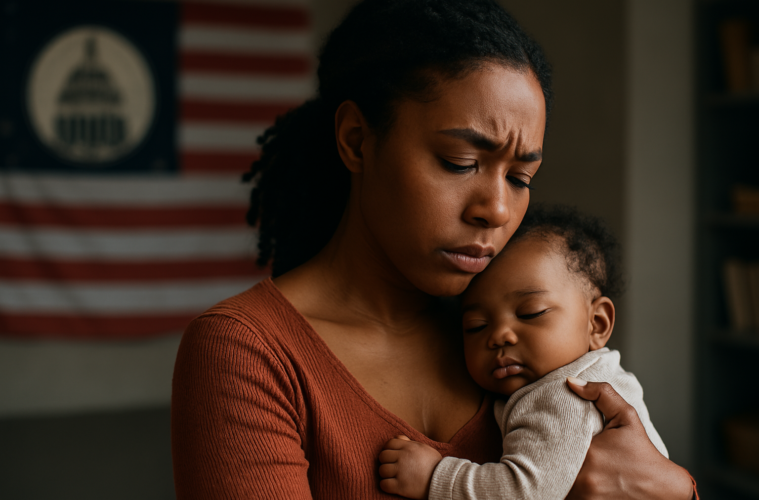By: Natalie Greene, student journalist
Millions of American women are waking up to a crisis they didn’t see coming—one that could strip away access to maternal care, mental health services, and critical support for their families. Congress has proposed a sweeping $800 billion cut to Medicaid, the largest in the program’s history. If passed, the consequences will fall hardest on women.
“Medicaid covers nearly half of all children in the United States and 41% of all births,” said Joan Alker, Executive Director of the Center for Children and Families, said at a March 21 American Community Media briefing.
For women in their reproductive years, Medicaid is often a silent lifeline—covering prenatal visits, childbirth, postpartum support, and care for their children.
These proposed cuts are not abstract numbers. They are a direct threat to the health and stability of over 31 million children and millions of mothers across the U.S. If Medicaid is slashed, states will be left with no choice but to reduce benefits, kick people off the rolls, or cut payments to providers.
“States will be left with some very bad choices… pitting very, very vulnerable populations against one another,” Alker warned.
For women balancing motherhood, careers, and caregiving responsibilities, Medicaid’s role is often invisible but essential.
“Medicaid is also vital for low-wage workers around the country. It’s vital for people with disabilities. It is the number one payer for behavioral health and mental health services,” Alker explained.
Mental Health: The Unspoken Crisis
More women today are speaking out about anxiety, depression, and burnout—but many rely on Medicaid to access that care.
“When patients are uninsured… they’re more likely to minimize or delay care,” said Joanne Preece, Director of Government and External Affairs at the Community Clinic Association of Los Angeles County. “This just leads to worse health outcomes in the long run.”
Preece emphasized that community health centers—often the only affordable healthcare option in underserved areas—will be among the hardest hit. “Cutting Medicaid will cause patients to fall off of coverage and will jeopardize the financial stability of community health centers… destabilizing health centers will force cutbacks in services.”
In Los Angeles County alone, 72% of patients at community health centers are covered by Medicaid. Across the country, that number is 50%. Without this funding, services like OB/GYN care, therapy, and chronic condition management are at risk.
It’s Personal—Even If You’re Not on Medicaid
Even women with private insurance are not immune. As Medicaid funding disappears, hospitals and clinics may shut down or reduce services.
“If you don’t have health insurance and want to turn to a community health center, you’re going to find that they’ve had to let a lot of staff go,” said Stan Dorn of UnidosUS. “They’ve had to close down some particular kinds of service lines… because they now have much less Medicaid revenue.”
Dorn also warned that these cuts aren’t about “fraud,” as some lawmakers claim. “People who are enrolled in Medicaid are the victims of fraud. They are not the perpetrators.”
Instead, these massive cuts are reportedly being pushed to help extend tax breaks that primarily benefit large corporations and the wealthy. “This is all being done to take resources away from working people and middle class people and give them to giant corporations and billionaires so they can buy more yachts and jewelry.”
A Call to Women: This Fight Affects You
Anthony Wright, Executive Director of Families USA, framed it simply: “These healthcare cuts will impact all of us… regardless of our race, our ethnicity, our party, our health provider, or how we get covered.”
For women navigating motherhood, work, caregiving, mental health struggles, and financial stress, Medicaid often fills the gap. Its loss would not just shake individual households—it could collapse the systems many women rely on to survive.
“Even if we do not directly depend on Medicaid, our local hospitals and clinics do,” Wright said. “Parents and caregivers are able to focus on their families… rather than the constant worry of putting food on the table or affording medical care.”
What You Can Do
This proposal is not law yet. Advocates stress that public awareness can make a difference.
“This is not a done deal… educating your readers about this issue is critical right now,” Alker said.
Contact your representatives. Ask them how they plan to vote—and remind them that nearly 75% of Americans believe Medicaid is vital to their community, including over 60% of Trump voters.
Because the reality is this: You may not think Medicaid affects you—until it does.

